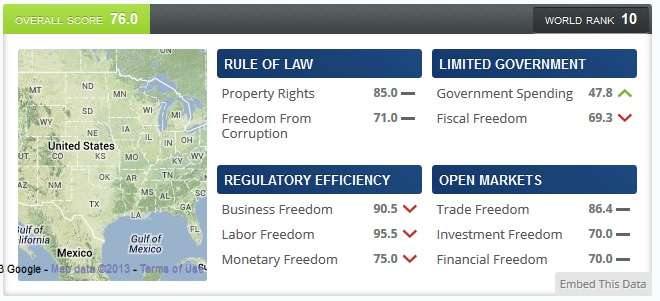Whoops! U.S. Slipped in Four Freedom Rankings This Year.
It's not yet time to break out the phony passports or head for the secret compound in the mountains, but the United States is taking a bit of a drubbing this year when it comes to assessments of the country's freedom and, more specifically, the direction in which the government is moving in terms of its respect for individual rights. While the U.S. still gets high marks relative to the vast majority of the world for the degree to which it respects the liberty of the individual, those standings are slipping. In two major rankings of economic freedom, one of Internet freedom, and a report on freedom of the press, the land of the free has been called out this year for being a little less free than it has been in the past, and for signs of a troubling trend toward greater surveillance and control.
In the Heritage Foundation's Index of Economic Freedom, the United States had already slipped out of the Free and into the Mostly Free category even before further losing ground this year.
The United States, with an economic freedom score of 76, has lost ground again in the 2013 Index. Its score is 0.3 point lower than last year, with declines in monetary freedom, business freedom, labor freedom, and fiscal freedom. The U.S. is ranked 2nd out of three countries in the North America region, and its score remains well above the world and regional averages.
Registering a loss of economic freedom for the fifth consecutive year, the U.S. has recorded its lowest Index score since 2000. Dynamic entrepreneurial growth is stifled by ever-more-bloated government and a trend toward cronyism that erodes the rule of law.

The Fraser Institute's Economic Freedom of the World: 2013 Annual Report (PDF) agrees that the country is on the wrong path.
Throughout most of period from 1980 to 2000, the United States ranked as the world's third-freest economy, behind Hong Kong and Singapore. As Exhibit 1.5 indicates, the chain-linked summary rating of the United States in 2000 was 8.65, second only to Hong Kong. By 2005, the US rating had slipped to 8.21 and its ranking fallen to 8th. The slide has continued. The United States placed 16th in 2010 and 19th in 2011. The 7.74 chain-linked rating of the United States in 2011 was nearly a full point less than the 2000 rating.
What accounts for the decline of economic freedom in the United States? While the US ratings and rankings have fallen in all five areas of the EFW index, the reductions have been largest in Legal System and Property Rights (Area 2), Freedom to Trade Internationally (Area 4), and Regulation (Area 5). The plunge in Area 2 has been huge. In 2000, the 9.23 rating of the United States was the ninth highest in the world. But by 2011, the area rating had slid to 6.93, placing the United States 38th worldwide. The 2.30-point reduction in the Area 2 rating of the United States was tied with Venezuela as the largest reduction among the countries rated.
Unshockingly in the year of Edward Snowden, the United States also won a booby prize for its treatment of Internet freedom. Freedom House's Freedom on the Net 2013 found:
The United States has a robust legal framework that supports free expression rights both online and offline, and the U.S. does not typically prosecute individuals for online speech. The broader picture of user rights in America, however, has become increasingly complex as a series of U.S. government practices, policies, and laws touch on, and in some cases appear to violate, the rights of individuals both inside the U.S. and abroad. Government access to phone and internet records is a major concern, especially following newly revealed information about NSA surveillance practices. Aggressive prosecution under the Computer Fraud and Abuse Act (CFAA) has also been criticized. In addition, the privacy of NGOs, companies, and individual users is threatened by a growing number of cyberattacks initiated by both domestic and international actors.
Not just NSA surveillance, but also the prosecution (really, persecution) of Aaron Swartz rated mention in the report. As a result, the U.S. suffered a "significant" loss in ratings of Internet freedom—an assessment that put it in the company of India, Brazil, and Venezuela in terms of slippage, though not (and, hopefully, never) in final ranking.

Freedom House still gives the United States high marks in press freedom, but that review predates revelations this year about secretive Justice Department investigations of reporters at the Associated Press, Fox News and elsewhere, and controversy over targeting of whistleblowers and other assaults on transparency by the Obama administration. Reacting to those developments, the Committee to Protect Journalists issued a not-so-rosy assessment warning:
U.S. President Barack Obama came into office pledging open government, but he has fallen short of his promise. Journalists and transparency advocates say the White House curbs routine disclosure of information and deploys its own media to evade scrutiny by the press. Aggressive prosecution of leakers of classified information and broad electronic surveillance programs deter government sources from speaking to journalists.
The developments former Washington Post executive editor Leonard Downie Jr. highlights in his report aren't new, nor are they unique to the Obama administration. But they have worsened with time and seem to be hitting critical mass, representing a sea change in the federal government's treatment of aggressive scrutiny by journalists and of government employees who talk to the press. Downie describes the terrorist attacks of September 11, 2001 as a "watershed" that triggered growth in the security state and hostility to independent scrutiny.
Again, the United States still ranks higher than most countries in terms of civil liberties, economic freedom and overall government respect for individual rights. But, across-the-board slippage in these areas, especially when it seems to be a continuing trend, isn't exactly a good sign.


Show Comments (143)